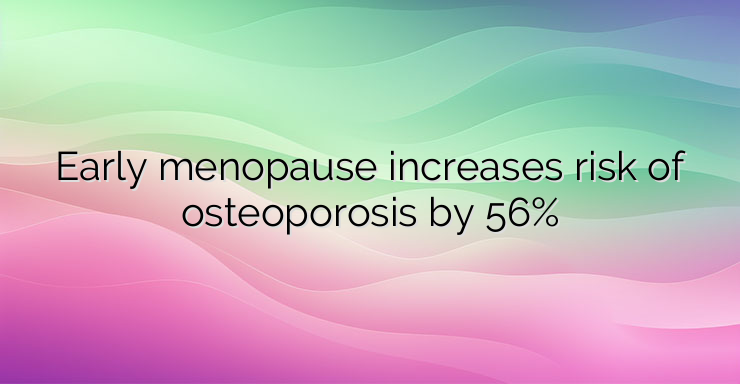Early menopause increases the risk of many health problems in women and osteoporosis is one of them. Women with early menopause are more at risk of losing bone density and their risk of developing osteoporosis at age 70 increases to 56% compared to 30% for women with normal menopause. Early menopause is considered to occur before the age of 47. International Menopause Day is celebrated on October 18, and this year it was dedicated to premature ovarian failure. A study in the scientific journal Human Reproduction shows that women with early menopause are nearly three times more likely to develop multiple chronic diseases. These diseases include diabetes, high blood pressure, heart disease, stroke, arthritis, osteoporosis, asthma, depression, anxiety and breast cancer. Loss of bone density after menopause is caused by a variety of factors, including genetic predisposition, side effects of steroid and anti-estrogen medications, and lack of exercise and activity. Often the causes of early menopause are genetic. Premature ovarian failure can also lead to early menopause, writes Thehealthsite. Removal of the ovaries due to malignancy can also cause early menopause. Osteoporosis is known as one of the “silent diseases” because its effects are not seen in its early stages. Women are four times more affected by bone loss than men. Estrogen, mainly a female hormone, is responsible for bone health, but after menopause, its levels decrease. Poor physical activity, smoking and alcohol intake increase susceptibility to osteoporosis. Being overweight is also a serious risk factor. Positive lifestyle changes can help tremendously. Walking and light aerobics are excellent for bone health. They support the entry of calcium into the bone mass. A healthy and balanced diet is essential for bone health as it provides all the nutrients for tissue renewal and growth. Fresh fruits and vegetables are a source of minerals and other nutrients needed for healthy bones. Intake of dairy foods and calcium-rich foods such as green leafy vegetables, spring vegetables, spinach and broccoli, beans, almonds, soybeans, sardines, salmon, beans and sunflower seeds are important. Vitamin D is essential because it allows calcium and phosphorus to be absorbed better. It can be obtained by staying in the sun or as a food supplement. It is good for women with early menopause to go out in the sunlight for at least 20 minutes daily. Source: Human Reproduction


Leave a Reply